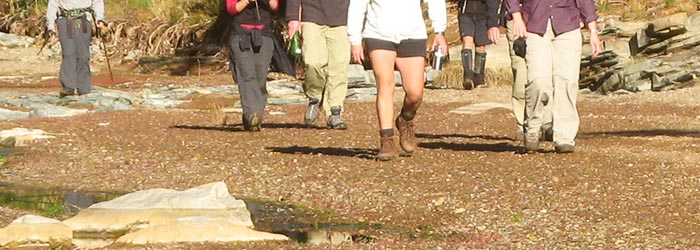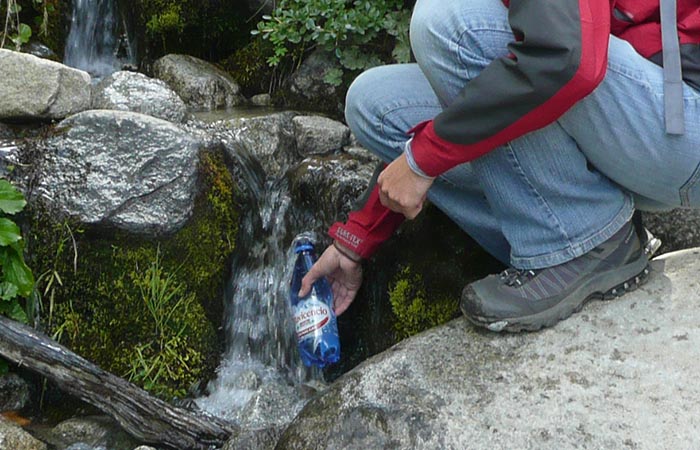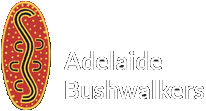Gear Checklist
View the
checklist of equipment to help your ensure you are appropriately prepared for an activity, such as a weekend walk or hike. Prime consideration is your safety, comfort and weather protection.

Food Ideas
View the
food ideas for multi-day hiking trips. Food needs to be light but tasty. Read the tips for snacks, breakfast, lunch, dinner and cooking utensils.
Water
Always bring water, at least two litres on day walks. Most overnight walks are organised around a campsite near water.
If a camp away from water is planned, each person must carry at least three litres of water into the campsite in addition to two litres to be consumed during the day. Further water may be needed for the next day.
Water should be used sparingly for cooking and drinking only. Always check the water situation with your walk leader.
Water can be carried in ordinary plastic soft drink bottles. Commercial water “bladder” systems or reused wineskins are useful for longer walks and pack down flat when not in use.

First Aid
All members are required to carry a basic first aid kit consisting of:
- plastic adhesive dressings
- crepe bandage
- antiseptic cream or iodine
- sun block
- triangular bandage
- safety pins
- box of matches (sealed in a plastic bag)
- money and emergency contacts list
- knife and scissors
Pack it into a waterproof bag and keep it in an accessible place in your pack (eg. the top pouch) For longer walks into more remote areas a more comprehensive kit will be required.
Mapping Tools & Resources
There are numerous mapping resources, websites, apps and tools available to bushwalkers to plan their hikes.
Throughout 2017 we’ll be adding how-to tutorials on the best tools.
Rules and Regulations
The club has a detailed constitution which is available on the ABW web site or may be viewed on application to the committee. For most members, sufficient information for normal conduct on walks is contained in by-law no. 5 reprinted in full below. The language has been edited to be inclusive.
- Walkers should ensure they have suitable equipment, experience and ability before undertaking a walk.
- If a walker cannot attend a previously arranged trip, they should inform the leader, and when applicable, their driver as soon as possible.
- Walkers must adhere to the decisions of the leader.
- Walkers have a responsibility to stay with the party at all times and to help all others in the party to do likewise.
- If a walker is separated from and unable to make contact with the party, they should telephone the emergency contact as soon as possible. This telephone number is listed on the program and on the back of membership cards.
Emergency Number: 08 8219 0063
Minimal Impact Bushwalking
Members are asked to respect shared principles of minimal impact bushwalking as described below:
- Leave no litter. This includes fruit and vegetable peels that may be biodegradable but take a long time to break down.
- Don’t pick flowers or damage growing timber.
- Limit campfires where possible. Follow fire bans and other restrictions as appropriate. Walk leaders have the final authority over whether a campfire may be lit.
- Camp away from isolated water holes. This may be the animals’ only source of water.
- Never allow soap or sun block to enter a watercourse. Residues can kill native animals.
- Carry a trowel for all overnight camping to dig toilet holes. Dig 50m away from any watercourse, or 50m up a hill if possible. Holes should be at least 150mm (6”) deep.
All rubbish must be carried home. Tins should be washed or burnt out, then bashed flat and carried home in a plastic bag. Don’t throw plastics, foil wrappings or foil lined paper packets on the fire.
Lost?
What to do if you get separated or lost from the group:
- Do not wander aimlessly!
- Sit down.
- Try to work out your position calmly.
- If you are at all unsure, make camp on the nearest suitable ground.
- Light a fire (where safe to do so) and stay put.
- The leader will be pleased to find you in this location, rather than 6km off the track.
- If you become separated from the party in an area where you can get access to phone coverage, try to contact a member of the Committee by phone or email as shown in the Committee list on the website. In an emergency phone 000.















